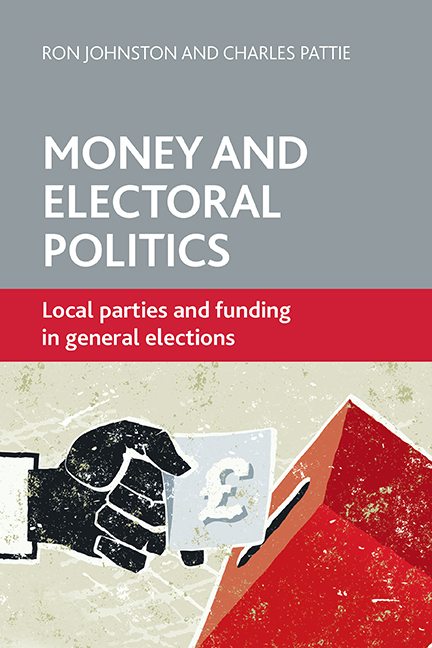Book contents
- Frontmatter
- Contents
- List of tables and figures
- About the authors
- Introduction
- one Follow the money: cash, party and electioneering in Britain
- two Money matters: local campaigns at British general elections
- three The financial health of local parties: the key to electoral success?
- four Raising the money: donations to local parties
- five Party funding futures
- In conclusion
- References
- Index
three - The financial health of local parties: the key to electoral success?
Published online by Cambridge University Press: 24 February 2022
- Frontmatter
- Contents
- List of tables and figures
- About the authors
- Introduction
- one Follow the money: cash, party and electioneering in Britain
- two Money matters: local campaigns at British general elections
- three The financial health of local parties: the key to electoral success?
- four Raising the money: donations to local parties
- five Party funding futures
- In conclusion
- References
- Index
Summary
The discussion in the previous chapter has shown that the amount of money spent by each political party's candidates on their local campaigns (mainly on materials advertising themselves and their policies) is a good indicator of the intensity of those campaigns. Further, and importantly, the amount spent is linked to the election outcome – greater spending is associated with better election results, although the extent of this influence varies according to the local context. This does not, of course, imply that money buys elections in Great Britain, but it does show that intensive local campaigning effort – of which money is a crucial component – brings electoral returns.
Given this conclusion, which has been consistently identified over the sequence of elections held since 1950 (Johnston, 1987), one might anticipate that parties would respond by allocating money from their central coffers to the constituencies where they anticipate that the seat might be won or lost. Spending money there could either gain a victory or prevent a defeat, which would affect the overall election outcome – and, for two of the parties at least, influence whether they formed the next government. A rational party would put its money where the votes that matter might be won or lost.
To a very considerable extent this does not happen at British elections. In recent decades, however, although central party organisations, realising the efficacy of well-run local campaigns, have increasingly coordinated them, substantial allocation of central party funds to local parties for their conduct during the year in which an election is held has not been the norm. Other resources have been provided, such as the organisation of constituency visits by leading party members, the secondment of staff to coordinate local campaigns (often for groups of, rather than single, constituencies), polling voters from national and regional call centres to provide databases that local party organisations can use in mobilising support, cheap printing of standard leaflets, and suggesting which constituencies activists might campaign in – but on few occasions has this involved the transfer of funds from the centre to the constituencies. The years preceding the 2010 General Election saw some change from this situation for two of the parties, however, as detailed below.
- Type
- Chapter
- Information
- Money and Electoral PoliticsLocal Parties and Funding at General Elections, pp. 85 - 122Publisher: Bristol University PressPrint publication year: 2014



